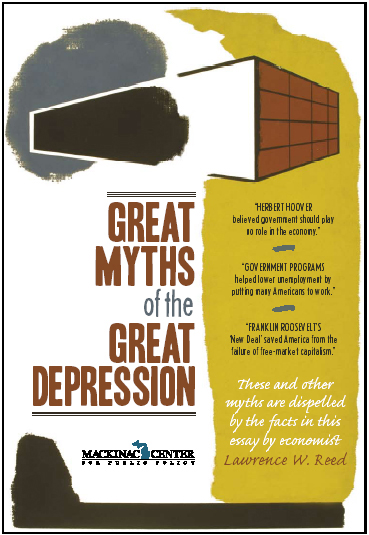Economic Fundamentals: Great Myths of the Great Depression
Do you think we are in the midst of "unprecidented" times? Hardly. Consider the following...
Washington was rife with both fear and optimism as [the president] was sworn in…fear that the economy might not recover and optimism that the new and assertive president just might make a difference. [A humorist] captured the popular feeling toward [the president] as he assembled the new administration: “The whole country is with him, just so he does something. If he burned down the capitol, we would all cheer and say, well, we at least got a fire started anyhow.”
[The president] did indeed make a difference, though probably not the sort of difference for which the country had hoped. He started off on the wrong foot when, in his inaugural address, he blamed the [economy] on “unscrupulous money changers.” He said nothing about the role of the Fed’s mismanagement and little about the follies of congress that had contributed to the problem. As a result of his efforts, the economy would linger in [a downturn].
At Harvard University… [former Director of the Bureau and Budget, Lewis W.] Douglas made it plain that America was facing a momentous choice:
Will we choose to subject ourselves — this great country — to the despotism of bureaucracy, controlling our every act, destroying what equality we have attained, reducing us eventually to the condition of impoverished slaves of the state? Or will we cling to the liberties for which man has struggled for more than a thousand years? It is important to understand the magnitude of the issue before us. ... If we do not elect to have a tyrannical, oppressive bureaucracy controlling our lives, destroying progress, depressing the standard of living ... then should it not be the function of the Federal government under a democracy to limit its activities to those which a democracy may adequately deal, such for example as national defense, maintaining law and order, protecting life and property, preventing dishonesty, and ... guarding the public against ... vested special interests?
The above was written by economist Lawrence Reed for the Mackinac Center for Public Policy. Reed isn't referring to today, but to Franklin Roosevelt and the 1930s. These are the times that forged "The Greatest Generation" who later stormed the beaches at Normandy and Iwo Jima. Somehow they managed to survive the folly of Hoover and cynical machinations of Roosevelt, leaving behind an historical record we can study so we avoid similar errors.
Today, the government is making a mess of things, but it's not on the scale of Hoover/Roosevelt. Hoover signed Smoot Hawley, which all but killed international trade. Roosevelt's first budget called for Federal spending that was 333% greater than Federal revenues.
Hoover raised income taxes from 24% to 63%. Roosevelt further raised them to 79%, then 90%. After Congress balked at his attempt to levy a top marginal tax rate of 99.5%, Roosevelt issued an Executive Order to tax all income over $25,000 at 100% and to lower the personal exemption to a level where nearly everyone would get hammered by income tax! Fortunately, Congress intervened and rescinded the Executive Order.
The illogical John Maynard Keynes held sway over economic thought. The Federal Reserve was run by clueless, bumblers who contracted money supply when the economy contracted.
Even though the Roosevelt era has been whitewashed by historians from FDR's administration, the economic actions that characterized the Depression seem insane today. We are unlikely to repeat them because we have the benefit of past experience and more mediums to use to communicate that experience.
No doubt, there are individuals who believe they can make things turn out different. Fortunately, it's unlikely they will be given the time to do much damage.
Economists and historians have been reassessing the Great Depression of late and examining the economic policies of Hoover and Roosevelt. While not the conventional wisdom, Roosevelt has to be the worst president in our nation's history with Hoover close on his heels. They are much worse than the hapless Carter because Carter was, well, hapless.
For small business owners the lesson is that the current downturn will not last and it's unlikely that it will get worse. While it's not fun, we've endured much darker times and pushed through them. We will push through these.
We may not benefit from the same peacetime expansion that occured after Truman became president but we will, without doubt, experience a something akin to an economic boom in the future. Now is the time to position your company to take advantage of it.
If you are not already, market aggressively. Build your company's brand in your market. Take share from competitors who falter. Start revamping your management systems and controls so they will serve a much larger company. Ignore and avoid peers and the press preaching doom and gloom. Stay positive and prepare for a wild ride!
To better understand the Depression, I strongly encourage you to download Reed's essay, Great Myths of the Great Depression (pdf). It's only 19 pages long and is very readable.


No comments:
Post a Comment